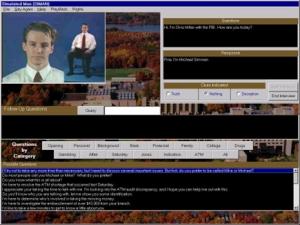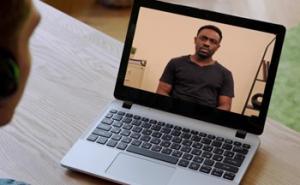Bootstrapping a Startup: A View of SIMmersion After 20 Years
Careful thought was given to starting up a company. As a result, SIMmersion is now celebrating 20 years of delivering virtual role-play training systems.
COLUMBIA, MD, UNITED STATES, October 28, 2022 /EINPresswire.com/ -- Starting a New Technology Company
In 1995, Dr. Dale Olsen was working for the Johns Hopkins University Applied Physics Laboratory (APL) (https://www.jhuapl.edu/). At the time, APL was heavily focused on supporting the missions of the Department of Defense (DOD) and NASA. The organization was considering expanding to support other government agencies. While at the FBI Academy in Quantico, Virginia, Dr. Olsen met with senior FBI staff and asked if there was interest in using APL’s military or space technology to support the FBI’s law enforcement and counterintelligence mission. The meeting led to a series of exploratory discussions and as part of that process, the FBI leadership identified the challenge of training new agents to successfully conduct investigative interviews.
In 1997, APL was contracted to develop an investigative interview training system for the FBI. They wanted a virtual role-player so that their new agents could practice interviewing a person of interest. (See Figure 1) Dr. Olsen’s goal was to make this virtual character as realistic as possible. The role-player, called Mike Simmen, was suspected of stealing from a bank. When learners used the system, they would discover that he was guilty half of the time. Learners had to determine if he was guilty by watching his body language and listening to what he said. Initially, the system was designed for new agents. However, it was quickly determined that there was a broader application for the system throughout the Bureau and the U.S. law enforcement community. (https://www.ojp.gov/ncjrs/virtual-library/abstracts/interview-challenge-mike-simmen-versus-fbi) Upon completion of the FBI contract, APL received 3 patents, and developed role-player systems for the Army, Marines, DEA, and U.S. Customs. The positive response and early success of the role-player training systems raised a new question: Was there enough of an opportunity to justify starting a new company?
The Market Needed Virtual Role-Players
Communication skills are difficult to teach with a slide deck. The FBI provided an example of this challenge while teaching interview skills to a highly gifted group of new agents in their “boot camp.” Practice is needed to build these skills and at that time, the only way to practice was with live role-plays. When training conversational skills, classroom students are sometimes used as role-players, but these sessions are often ineffective because practice time was limited, and student role-players lacked realism. Alternatively, actors can be hired and trained, but this often results in high costs, and they do not provide enough practice time. Virtual role-players would provide sufficient and effective practice, reduce overall costs, and provide a realistic training experience.
Is a New Company Justified?
Before launching a new company, it was necessary to carefully consider venture capital and angel investments. However, bootstrapping seemed like the best alternative. With 90% of startups failing, and without outside funding, the odds were against survival. There was a market, but would the products be good enough to make people change their ways and use virtual role-player? Could this new technology supplement or replace people as role-players?
There was evidence that they could, as demonstrated by the success of the products APL had developed and shared. When demonstrating the suicide prevention role-play, people would sometimes tear up, as the role-player seemed so real. Other role-players would draw people in like an addictive game. This happened for several reasons. The role-players were created using video to make the virtual role-players appear real. Since developing relationships is an important part of conversational skills, the role-players needed to have and display realistic emotions. They needed to be able to “call out” user’s inconsistencies, so they needed memory. Like real people, they needed to be unpredictable, so each role-player starts with one of several different randomly selected personalities. To make practice interesting, no two role-play experiences are ever the same. The technology was called PeopleSim®. Since the experiences being provided seemed real, and the market seemed to want the technology, the decision was made to launch a company.
In 2002, SIMmersion LLC was launched as a spin out of APL. In the next few years, the new company developed five systems for the FBI, and more than 50 over the next 20 years covering a variety of critical communication skills from performance coaching to opioid use disorder treatment.
Technology Evolution
Since the technology was developed in 1997, it has continually improved. SIMmersion listened closely to their customers’ feedback and requests, and have consistently met or exceeded their expectations. The role-players are incorporated in comprehensive training systems with integrated e-learning and are now available online around the world. There is a long list of technology improvements that allow for customization of the training and improved development efficiencies including Monte Carlo testing, improved authoring software, APIs, and video processing support software. Perhaps, the new technology that users find most needed is the comprehensive learning management system that provides administrative control over the delivery of the systems along with detailed tracking and reporting.
Twenty Years After Starting
SIMmersion’s success is measured by the number of lives improved and saved. Their suicide prevention training systems instill evidenced-based methodology in service providers. Their addiction counseling training helps counselors better serve their clients. Their job interview training tools help young people with disabilities find competitive employment. Their gender affirmative care systems help to improve healthcare delivery for the LGBTQ+ community. Ultimately, each of their role-player training systems are developed to help improve people’s lives and when they do, the company must be considered successful.
Dale Edward Olsen
SIMmersion
+1 443-745-5754
email us here
SIMmersion Training System Overview
Legal Disclaimer:
EIN Presswire provides this news content "as is" without warranty of any kind. We do not accept any responsibility or liability for the accuracy, content, images, videos, licenses, completeness, legality, or reliability of the information contained in this article. If you have any complaints or copyright issues related to this article, kindly contact the author above.



